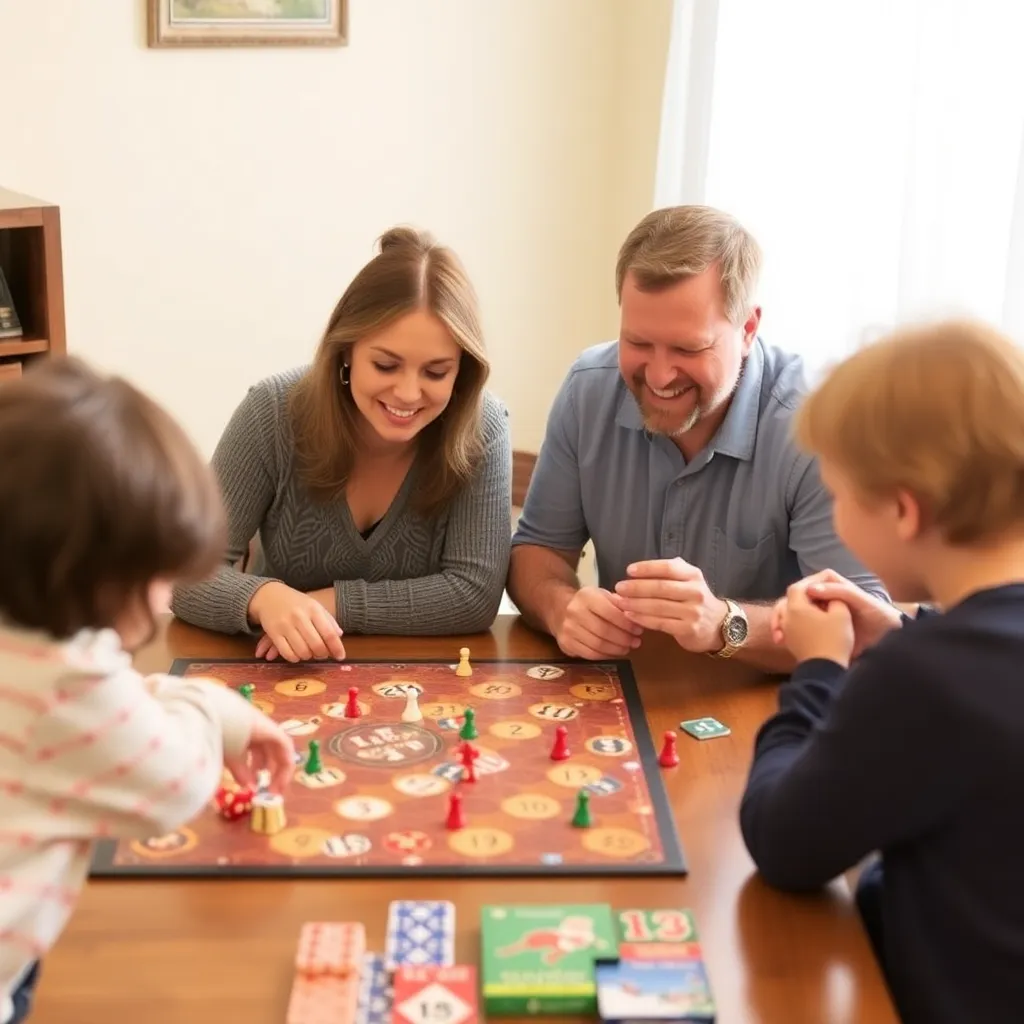Answer | Parenting is often a balancing act, and playtime is no exception. When it comes to playing games with children, parents face a choice: should they embrace the competitive aspect of games to teach valuable life lessons, or should they focus on keeping things light and fun to foster enjoyment and bonding? This question comes up frequently in the world of family gaming, especially as competitive games can evoke a wide range of emotions—from joy and excitement to frustration and disappointment.
While some believe that competition can help children build resilience, learn about losing gracefully, and develop a sense of achievement, others argue that gaming should be an inclusive and enjoyable experience, free from stress and pressure. This article delves into both sides of the debate, examining the benefits and drawbacks of competitive gaming versus casual, fun-oriented gameplay, and offers a selection of unique game options for parents who want to strike the right balance.
The Benefits of Competitive Games for Kids
Competitive games have been a part of human culture for centuries, from ancient board games to modern video games. The thrill of competition can be exhilarating, providing players with a sense of achievement and satisfaction. But is this competitive spirit beneficial for children, especially when playing with their parents? Let’s explore the advantages.
1. Building Resilience and Handling Failure
One of the key benefits of competitive games is that they teach children how to handle losing. In a world where not everything goes according to plan, learning to lose gracefully is an important life skill. Games like Chess or Ticket to Ride can present kids with challenges where they may not always win, but they learn that losing is part of the experience. Parents can model good sportsmanship and resilience by handling their own victories and losses in a gracious way, showing their children how to manage emotions in both scenarios.
Competitive games also help children understand that persistence is essential. If they lose in one round, they might do better in the next. These lessons in perseverance and resilience can have long-lasting effects on how children approach setbacks in school, sports, and other areas of life.
2. Enhancing Critical Thinking and Strategy
Competitive games often require players to think critically, plan ahead, and make decisions that can impact the outcome. For children, this can be a valuable cognitive exercise. Games like Blokus or Splendor challenge players to strategize, manage resources, and consider multiple factors before making a move. Playing these games with parents can stimulate children’s intellectual development while encouraging them to think on their feet and adapt to changing situations.
For example, Blokus is a puzzle-like game that involves placing pieces strategically on the board, while Splendor requires players to accumulate resources to build card combinations. These types of games foster problem-solving skills and help children think critically about their actions, which can benefit them in both academics and everyday life.
3. Promoting Healthy Competition
While competition can be stressful for some, it also has the potential to foster a healthy, productive sense of rivalry. When handled correctly, competitive games can show children that competing is not about being “better” than someone else, but about challenging themselves to improve. For parents, this means emphasizing personal growth and learning rather than focusing solely on winning.
Parents can use competitive games as an opportunity to discuss goal-setting and personal achievement. In games like Catan Junior, for instance, children can compete by trying to achieve specific goals, like collecting resources or building the best island. The game’s competitive aspect pushes them to improve their performance while focusing on the fun of the experience rather than the final outcome.
The Importance of Keeping Games Fun and Casual
On the flip side, many parents choose to prioritize fun over competition when playing games with their kids. After all, the primary goal of family gaming is to foster connection and enjoyment. Here are some compelling reasons to focus on fun rather than competition during game time.
1. Encouraging Cooperation and Bonding
When parents play games that emphasize collaboration and teamwork, it helps build a stronger connection with their children. Games like Forbidden Island or Outfoxed! encourage players to work together towards a common goal, making gameplay more about bonding and less about winning. In cooperative games, there is no “loser,” which can create a more relaxed and enjoyable atmosphere for children who may feel anxious about competitive settings.
For example, in Forbidden Island, players work as a team to collect treasures and escape the sinking island. The game encourages communication, collaboration, and problem-solving, helping children understand that sometimes the best outcomes come from working together rather than competing against each other.
2. Reducing Stress and Anxiety
For some children, competitive games can cause stress and anxiety, especially if they have a strong desire to win or fear losing. By choosing games that emphasize fun and creativity over competition, parents can create a more relaxed and enjoyable gaming environment. Games like Rhino Hero or Dixit focus on creativity, imagination, and lighthearted fun rather than strict rules or winning strategies.
Rhino Hero is a simple, fun game where players take turns stacking cards to build a tower for a rhino to climb. The goal is to keep the tower standing, but the outcome is unpredictable, leading to plenty of laughter and excitement without the pressure of competition. Similarly, Dixit is a storytelling card game where players interpret abstract images in creative ways, encouraging imagination and expression without any focus on winning or losing.
3. Fostering Creativity and Imagination
Casual, fun games often encourage creativity and imagination, which can be beneficial for children’s cognitive development. Games like Telestrations or Hoot Owl Hoot! focus on creativity, storytelling, or puzzle-solving rather than strategy and competition. This kind of open-ended play allows children to express themselves freely, experiment with ideas, and enjoy the game without worrying about the outcome.
Telestrations is a hilarious drawing game that combines telephone and Pictionary, where players draw and guess each other’s drawings. The fun lies in the creative (and often wild) interpretations of the sketches, leading to moments of laughter and bonding. Hoot Owl Hoot! is a cooperative game where players help owls return to their nest, with a focus on teamwork and helping each other, creating a positive and supportive atmosphere.
If You Are Parents, So You Can Learn More About: Can Strategy Games Help Parents Enhance Their Problem-Solving Skills?
Unique and Less Common Game Recommendations
While there are many popular games parents can play with their kids, some lesser-known games can offer unique experiences that emphasize both competition and fun in different ways. Here are a few unique options to consider:
1. Dragonwood
Dragonwood is a card-and-dice game where players embark on an adventure to capture mythical creatures. Players collect cards and roll dice to defeat dragons and other creatures, using strategic combinations of cards. The competitive element comes from trying to capture the most valuable creatures, but the fantasy theme and engaging mechanics keep it light and fun.
This game teaches both strategy and adaptability, as players must decide when to strike and when to wait for the right moment, making it a good choice for parents and kids who want a balance between competition and entertainment.
2. Labyrinth
Labyrinth is a shifting maze game where players navigate a constantly changing maze to collect treasures. The game combines puzzle-solving with strategic planning, as players must anticipate how the maze will change with each turn. While there’s a competitive aspect to collecting treasures, the game’s emphasis on navigating the maze adds an element of fun and unpredictability.
This game is a great option for families who want a competitive challenge without the high-stakes atmosphere, as the moving maze adds an element of surprise and creativity.
3. Zombie Kidz Evolution
Zombie Kidz Evolution is a cooperative game where players work together to defend their school from zombies. As players complete games, they unlock new abilities and powers, evolving the gameplay over time. The competitive aspect lies in completing missions and defeating zombies, but the cooperative gameplay ensures that everyone works towards a common goal.
The evolving nature of the game adds a unique twist, as players unlock new challenges and abilities as they progress, keeping the game fresh and exciting for both kids and parents.
Striking the Right Balance: Competition vs. Fun
Ultimately, the decision to focus on competition or fun when playing games with children depends on the personalities and preferences of both parents and kids. For some families, competitive games can provide valuable life lessons in resilience, strategy, and personal growth. For others, focusing on fun, creativity, and bonding may be more important.
Parents can strike the right balance by mixing competitive and cooperative games, ensuring that their children experience the benefits of both styles of play. By choosing games that suit their family’s dynamics, parents can create enjoyable and meaningful gaming experiences that foster both skill development and connection.
For instance, parents can alternate between games like Catan Junior (which offers a soft competitive experience) and cooperative games like Outfoxed!, ensuring that kids are exposed to both teamwork and the challenges of competition. This approach allows children to develop problem-solving skills, resilience, and communication abilities while still having fun.
Conclusion
Playing games with children is an opportunity for parents to bond, teach valuable skills, and enjoy quality time together. Whether parents choose to embrace competitive games or keep it light and fun, the key is to create an environment that fosters growth, learning, and enjoyment. By incorporating both competitive and casual games, parents can offer their children a balanced gaming experience that builds critical life skills while also fostering connection and creativity.
Games like Dragonwood, Labyrinth, and Zombie Kidz Evolution provide unique, less common options for parents looking to expand their family game nights, offering the perfect mix of competition and fun. Whether you’re teaching your child how to handle winning and losing, or simply enjoying a creative adventure together, family gaming can be a rewarding experience for everyone.

